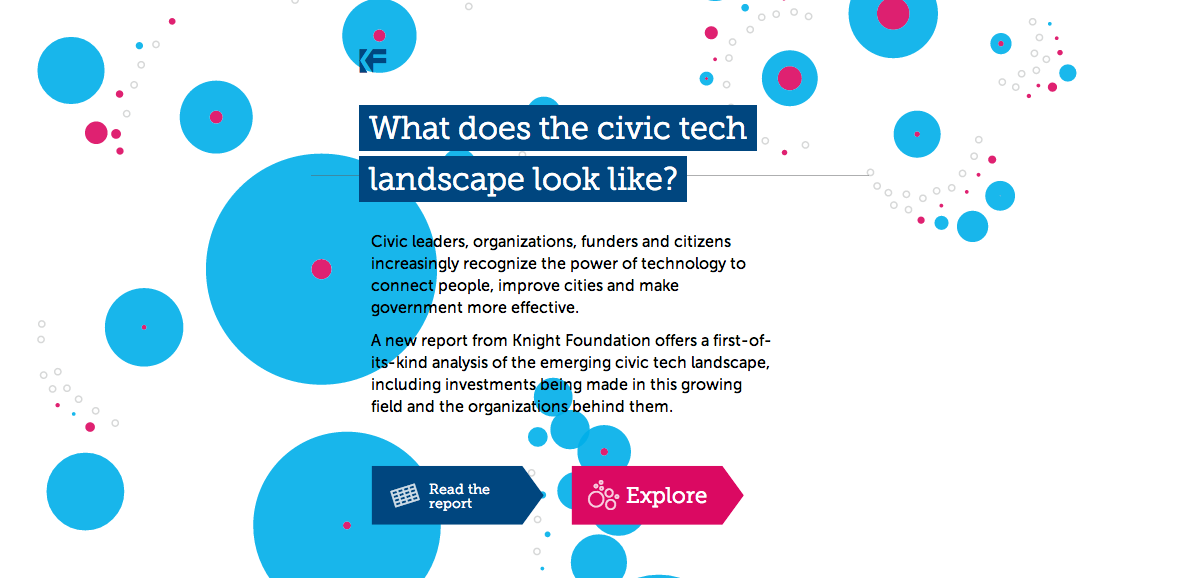
Pulling back the curtain on civic tech
At Knight Foundation we believe that democracy thrives when communities are informed and engaged. That has increasingly led us to experiment with new technologies that advance civic health and vitality. Since 2010, Knight has invested more than $25 million in technology ranging from open government tools that improve public data access and service delivery, to platforms that empower residents to connect and collaborate around civic issues.
We’re not alone. Through our work, we regularly encounter civic leaders, community organizations and funders working at the intersection of technology, civic innovation and open government. The terminology may vary, but what binds this group of practitioners together is an intention to harness technology to spur citizen engagement, improve cities and make government more effective. There’s a palpable energy surrounding this movement, but the lack of common language and deeper insights about activity in this field has constrained its growth and impeded further collaboration. Related REPORT
“New tools produce better understanding of investments in civic tech” by Sean Gourley on KnightBlog
“Knight Foundation’s civic tech report: why it matters” by Tom Steinberg on KnightBlog
“Strange bedfellows or yin and yang” by Stacy Donohue on KnightBlog
“Civic tech report helps ID opportunities in the field” by Keya Dannenbaum on KnightBlog
“Urban neighborhoods take small steps into ‘civic tech‘” by Patrick Barry on KnightBlog
A new report released today by Knight titled “The Emergence of Civic Tech: Investments in a Growing Field” aims to advance the movement by providing a starting place for understanding activity and investment in the sector. The report identifies more than $430 million of private and philanthropic investment directed to 102 civic tech organizations from January 2011 to May 2013. In total, the analysis identifies 209 civic tech organizations that cluster around pockets of activity such as tools that improve government data utility, community organizing platforms and online neighborhood forums. Along with the report, we’ve developed an interactive data visualization tool with the help of Fathom to explore the network of civic tech organizations and their connections to one another.
In addition to scanning civic tech organizations, the report examines investors in this growing field and implications for ongoing philanthropic support. An overwhelming 84 percent of funding to civic tech organizations has come from private capital, though philanthropic capital outpaces private investment in clusters of tech related to open government. The analysis reveals an opportunity for greater co-investment by foundations, which have rarely teamed with other types of investors to fund civic tech organizations. Finally, the report suggests a few areas—such as peer-to-peer sharing of goods and services—that have already attracted significant amounts of private capital where philanthropy could perhaps have more influence by pursuing policy changes than it could through more small grants.
Equally exciting for us has been piloting this new, data-driven approach for doing social sector research. Knight worked with Quid, a firm that specializes in data analytics and network analysis, to map the field and overlay investment data contained in Quid’s database dating back to January 2011. Our intention from the start was to make the data open and we’ve developed a civic tech data directory with all the organizations and investments included in the review.
But the real power of the review will come through continuing to update it over time. Our current analysis is certainly not exhaustive, and there have undoubtedly been investments in civic tech organizations that eluded Quid’s review of private and philanthropic reporting databases. That’s why we’re seeking feedback and suggestions for other organizations and investments to include in the analysis; we will continuously update the data directory and will refresh the analysis in 2014. We don’t see this as just an attempt to document civic tech’s past; it’s a step for building shared insights and strategies around the future of civic tech where none previously existed.
Jonathan Sotsky, director of strategy and assessment at Knight Foundation
Recent Content
-
Communitiesarticle ·
-
Communitiesarticle ·
-
Communitiesarticle ·


